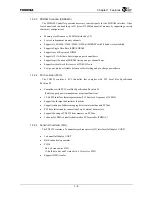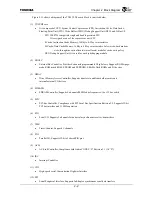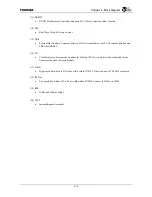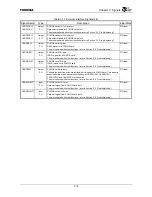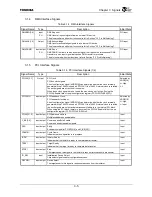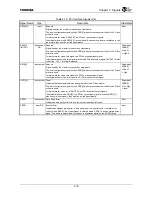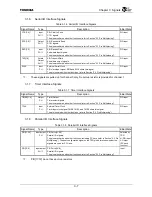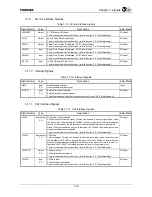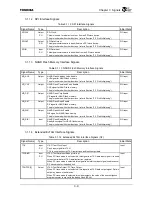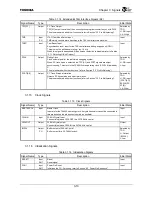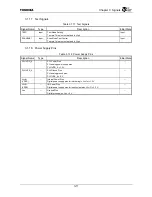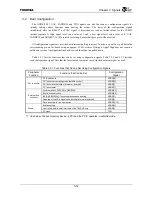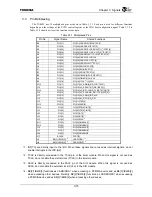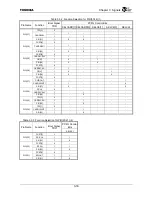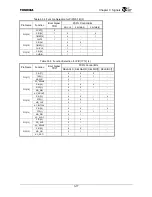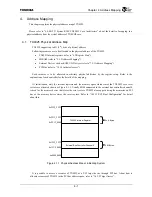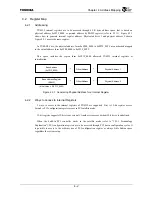
Chapter 3 Signals
3-6
Table 3.1.5 PCI Interface Signals (2/2)
Signal Name
Type
Description
Initial State
REQ[3:2]
*
Input
Request
Signals used by the master to request bus mastership.
The boot configuration signal on the ADDR[1] pin determines whether the built-in PCI bus
arbiter is used.
In internal arbiter mode, REQ[3:2]
*
are PCI bus request input signals.
In external arbiter mode, REQ[3:2]
*
are not used. Because the pins are still placed in the
input state, they must be pulled up externally.
Input
REQ[1]
*
/INTOUT
Input/output/
OD
Request
Signal used by the master to request bus mastership.
The boot configuration signal on the ADDR[1] pin determines whether the built-in PCI bus
arbiter is used.
In internal arbiter mode, this signal is a PCI bus request input signal.
In external arbiter mode, this signal is an external interrupt output signal (INTOUT). Refer
to Section “15.3.7 Interrupt Requests”.
Selected by
ADDR[1]
H: Input
L: High-Z
REQ[0]
*
Input/output
Request
Signal used by the master to request bus mastership.
The boot configuration signal on the ADDR[1] pin determines whether the built-in PCI bus
arbiter is used.
In internal arbiter mode, this signal is a PCI bus request input signal.
In external arbiter mode, this signal is a PCI bus request output signal.
Selected by
ADDR[1]
H: Input
L: High
GNT[3:0]
*
Input/output
Grant
Indicates that bus mastership has been granted to the PCI bus master.
The boot configuration signal on the ADDR[1] pin determines whether the built-in PCI bus
arbiter is used.
In internal arbiter mode, all of GNT[3:0]
*
are PCI bus grant output signals.
In external arbiter mode, GNT[0]
*
is a PCI bus grant input signal. Because GNT[3:1]
*
also become input signals, they must be pulled up externally.
Selected by
ADDR[1]
H: All High
L: Input
PERR
*
Input/output
Data
Parity
Error
Indicates a data parity error in a bus cycle other than special cycles.
Input
SERR
*
Input/OD
System
Error
Indicates an address parity error, a data parity error in a special cycle, or a fatal error.
In host mode, SERR
*
is an input signal. In satellite mode, SERR
*
is an open-drain output
signal. The mode is determined by the boot configuration signal on the ADDR[19] pin.
Input
Содержание TMPR4925
Страница 1: ...64 Bit TX System RISC TX49 Family TMPR4925 Rev 3 0 ...
Страница 4: ......
Страница 15: ...Handling Precautions ...
Страница 16: ......
Страница 18: ...1 Using Toshiba Semiconductors Safely 1 2 ...
Страница 40: ...3 General Safety Precautions and Usage Considerations 3 18 ...
Страница 42: ...4 Precautions and Usage Considerations 4 2 ...
Страница 43: ...TMPR4925 ...
Страница 44: ......
Страница 54: ...Chapter 1 Features 1 8 ...
Страница 58: ...Chapter 2 Block Diagram 2 4 ...
Страница 88: ...Chapter 4 Address Mapping 4 12 ...
Страница 226: ...Chapter 8 DMA Controller 8 58 ...
Страница 260: ...Chapter 9 SDRAM Controller 9 34 ...
Страница 480: ...Chapter 15 Interrupt Controller 15 32 ...
Страница 554: ...Chapter 19 Real Time Clock RTC 19 8 ...
Страница 555: ...Chapter 20 Removed 20 1 20 Removed ...
Страница 556: ...Chapter 20 Removed 20 2 ...
Страница 564: ...Chapter 21 Extended EJTAG Interface 21 8 ...
Страница 580: ...Chapter 22 Electrical Characteristics 22 16 ...
Страница 586: ...Chapter 23 Pin Layout Package 23 6 23 2 Package Package Type Package Code 256 pin PBGA PBGA 4L P BGA256 2727 1 27A4 ...
Страница 588: ...Chapter 24 Usage Notes 24 2 ...
Страница 590: ...Appendix A TX49 H2 Core Supplement A 2 ...

